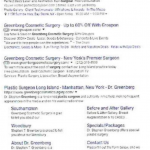
Section 230 Doesn’t Protect Advertising “Background Reports” on People–Lukis v. Whitepages
Whitepages compiles and generates “background reports” on people, remixing content from a database of public and private records that allegedly incorporates 2B+ records/month. In response to searches on people’s names, Whitepages provides free previews, such as this one included in…

Videogame Can Replicate Musician’s “Signature Move” (Unless It’s a False Endorsement, Which It Isn’t)–Pellegrino v. Epic Games
Pellegrino is a saxophone player with “externally rotatable feet,” which has helped him develop a nifty “signature” dance move while playing. The videogame Fortnite sells “emotes,” optional customizations for players’ digital avatars. Pellegrino alleges that the “Phone It In” emote…
Yelp Defeats Businesses’ “Right to Be Forgotten” Claims—Spiegelman v. Yelp
The plaintiffs sued Yelp for using their business information, including their names, photographs and likenesses, without permission. Though the opinion doesn’t expressly state it, it appears these plaintiffs were seeking to get delisted from Yelp’s databases, which is why I’m…
Ninth Circuit Declines to Shelve Lawsuit Alleging Facebook Violated Illinois Biometric Privacy Statute
Illinois enacted a biometric privacy statute which restricted the collection of biometric identifiers. Plaintiffs, Illinois residents and Facebook users, alleged that Facebook violated this statute by collecting, storing, and processing their face-scans without their consent and without establishing the requisite…
New Jersey Attorney Ethics Opinion Blesses Competitive Keyword Advertising (…or Does It?)
In 2016, the Texas Bar issued an opinion decisively blessing competitive keyword advertising by lawyers. (Note: I define competitive keyword advertising as buying a rival’s name/brand as the trigger for ads without displaying the name/brand in the ad copy). At…

Another Competitive Keyword Advertising Lawsuit Fails–Dr. Greenberg v. Perfect Body Image
Dr. Stephen Greenberg is a plastic surgeon on Long Island. Perfect Body Image provides “non-surgical and non-invasive aesthetic services, including, among other things, laser treatments.” Perfect Body doesn’t have any doctors on staff. In addition to Stephen, at least two…
Facebook Defeats Pro Se Consumer Privacy Suit–Hassan v. Facebook
This is a pro se privacy lawsuit by 4 longtime Facebook users (from 2007-09). It covers a lot of the same topics as the dozens of pending privacy class action lawsuits against Facebook. Not surprisingly, as a pro se suit,…
Vermont Supreme Court Dismisses Nonconsensual Pornography Prosecution–State v. VanBuren
Last year, the Vermont Supreme Court upheld Vermont’s sui generis crime of nonconsensual pornography dissemination (13 V.S.A. § 2606) from a facial constitutional challenge. This ruling was surprising because the court said that the law didn’t fit into any of…
The Florida Bar Regulates, But Doesn’t Ban, Competitive Keyword Ads
The Florida Bar has a drama-filled history regarding the regulation of competitive keyword advertising by lawyers. This post explains the background. In 2013, the bar was poised to ban competitive keyword ads, but at the last minute it did a…
An Email Inbox Isn’t a “Place” for Purposes of Florida Privacy Law–Hall v. Sargeant
One of the most venerable cyberlaw questions: is cyberspace a physical place, and does it matter legally? For purposes of Florida’s privacy invasion law, a federal district court answers: no and yes. This case involves long-running litigation and drama between…
